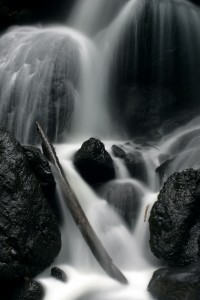For all the talk about malts and hops and yeast in beer, the truth remains that it is mostly plain old water (someone once called it “flavored water.” But what a flavor it is).
So perhaps it isn’t surprising that there has been a fair bit of talk in the beer press of late about clean water issues.
A number of craft brewers have joined with the Natural Resources Defense Council to lobby for strong enforcement of the federal Clean Water Act, Scientific American and other publications report. None of our North Coast breweries are on the list yet, but given the environmental activism in these parts, it wouldn’t be a surprise to see them pop up. And of course, Sierra Nevada is one of the charter members. Here’s the latest list from the NRDC.
Meanwhile, a group of Colorado brewers has come out strongly against “fracking” in that state. That’s the method of extracting oil and natural gas from difficult terrain by using water, air, and chemicals to widen the gaps in rock layers to allow the gas escape into wells. It’s an old technique, but recent technological advances have caused a huge fracking boom in many states and revolutionized the U.S. oil and gas industry. The downside, at least according to critics, is that the process can do bad things, like destabilize fault lines and, yes, contaminate ground water. The industry has denied the problems, but the drum beat against fracking has remained strong; New York state banned the practice after a documentary movie, Gasland, chronicled contamination in neighboring Pennsylvania, which has been a major center of fracking.
Now 26 Colorado breweries are starting a campaign to get Gov. John Hickenlooper, himself the founder of Wynkoop Brewing in Denver, to put limits on the lucrative drilling technique, citing concern about contamination. The campaign, starting with a public letter from the brewers, puts the brewer/governor in a tough spot since he has been an active proponent of fracking, citing its enormous economic potential for rural landowners.
“The craft brewing industry is a great economic driver for Colorado and we value our relationship with brewers across the state,” spokesman Eric Brown told the Colorado Statesman newspaper. “We are reviewing the letter and will respond appropriately.”
Even when contamination is not at issue, water quality is a big thing for brewers. Entire styles and brewing cultures have developed around local water: the relatively hard water of southern England was ideal for the pale ales that made the area famous, while the softer water of Eastern and Central Europe are perfect for the Pilsners that flow from German and Czech breweries.
Today, it is possible for brewers to compensate for all sorts of faults – adding and removing minerals as styles dictate, and filtering to remove contamination and chemicals such as chlorine.
But still good local water matters and it can affect decisions about where breweries locate and expand. Lagunitas, for example, chose to develop a new brewery in Chicago not just because of its strategic location, owner Tony Magee told me earlier this year, but also because of the good water. In the West, Tony said, the water quality varies widely by season as water agencies switch between various sources to compensate for the head-spinning swings between California’s wet and dry seasons. That means a complex and time consuming regime of testing, filtration and treatment to keep water consistent through the year. Chicago’s Lake Michigan water is of good quality and is rock-solid consistent through the year, he said.
Who needs icy cold Rocky Mountain spring water when you can have Lake Michigan?
– Sean Scully


 buyer at Fircrest Market in Sebastopol and the administrator of the NorCal Beer Geeks group on Facebook.
buyer at Fircrest Market in Sebastopol and the administrator of the NorCal Beer Geeks group on Facebook.